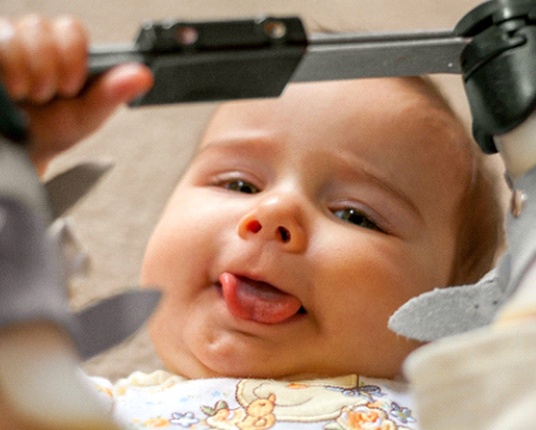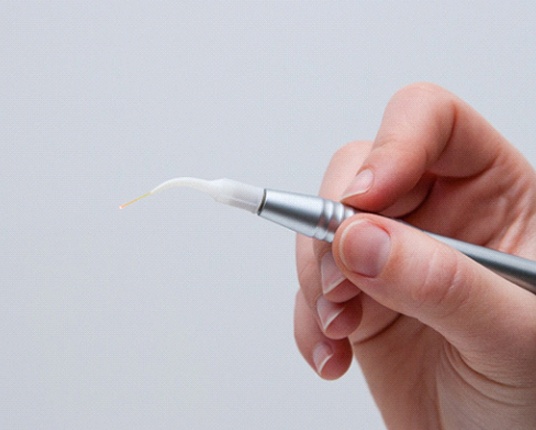Lip & Tongue-Tie Treatment – Hamilton, ON
Releasing the Band for Improved Functionality
Is your baby fussy? Are they trying to nurse but cannot seem to get a good latch? Are you feeling depressed or frustrated because of the difficulties arising with breastfeeding? You’re not alone. There is a common problem that can keep babies, children, teenagers, and even adults from being able to have full motion of their lips or tongues. Known as a lip- or tongue-tie, these restricted bands of tissues can make life much more difficult. Fortunately, with a frenectomy in Hamilton, the problem can be quickly and easily fixed with little-to-no downtime afterward. Call us today to schedule an appointment to learn more.
How Do Lip and Tongue-Ties Develop?

Lip and tongue-ties develop during birth. While in the womb, apoptosis occurs, which means the lips and tongues separate from the mouth, making it possible for your baby to move them without restriction. However, when they do not detach fully, it can hinder the amount of movement.
Although former, more traditional techniques have been used to treat these banded tissues (sutures and scalpels), many dental professionals now use a soft tissue laser. This makes for an easier, less worrisome, and more comfortable experience for both the parent and child.
Why Is It Important to Treat Lip & Tongue-Ties?

It is important to have a dentist in Hamilton treat your child’s lip or tongue-tie simply because it can they will attain a wider range of motion when it comes to their lips and/or tongue. Children, teenagers, and adults are known to have worsening issues as they grow older.
While your little one is still a baby, forgoing or neglecting treatment will only make breastfeeding harder, increase their chances of having colic or acid reflux, have poor weight gain, and experience increased fussiness and fatigue. Over the years, many of these problems can morph into a speech impediment as well as a gap between their upper front two teeth that may cause them to feel self-conscious.
As a nursing mother, you, too, may experience extreme tiredness, depression, cracked and sore nipples, blocked ducts, and more.
Lip & Tongue-Tie Treatment

Lip and tongue-tie treatment is also referred to as a frenectomy. Completed using a soft tissue laser, Dr. Rullo can create a gentler, more comfortable, and safer environment and experience for you and your child.
It’s unlikely your little one will need anesthesia, so they will lie back while Dr. Rullo uses the concentrated beam of light to gently release the tissue, immediately improving the range of motion. Following the procedure, mothers are encouraged to nurse immediately.
One of the best things about laser frenectomies is they minimize bleeding and swelling as well as the chance of infection. There is very little to no downtime, and they are increasingly quick to perform.
Lip-Tie Care

Following lip-tie treatment, it is important to prevent the tissue from reconnecting. For a few days afterward, you will need to gently stretch the tissue to make sure it heals properly. Lay your baby in front of your on your lap. With clean hands, lift the lip with your thumbs and index fingers and roll it away from the nose. After holding this position for about 10 seconds, gently rub the frenectomy site. We recommend doing this before nursing so that you can breastfeed to help them calm down after these exercises.
Lip and Tongue-Tie FAQs

If you just learned that your child needs a frenectomy to address their lip- or tongue-tie, do not be alarmed. This is common among many infants and is treatable among all ages. Naturally, though, you probably have many questions. The idea of having your little one undergo a procedure that requires altering the soft tissues inside their mouth can be concerning for any parent, but at Hamilton Pediatric Dental Care, our team is here to address your concerns and provide honest answers to your more pertinent questions. Feel free to review the FAQs listed below and call us with any additional questions.
How should I prepare my baby for a frenectomy?
The best thing you can do to prepare your baby for a frenectomy is to provide lots of love and attention. You’ll also want to feed them 1-1.5 hours before their procedure. This will ensure that they will be hungry immediately following the appointment and be encouraged to nurse.
While your baby does not understand what is going on, alleviating stress is important, as they can pick up on your anxiety.
Also, in the days leading up to their frenectomy, try doing some exercises with your little one that allow them to practice using their tongue for suction. You can do this by placing your finger on their tongue and allowing them to suck. When pulling it away, they will need to suck harder to keep it in place.
How long does a frenectomy take?
On average, a frenectomy should not take more than a few minutes. When using a soft tissue laser, the process is quick and easy. However, should your little one’s banded tissue be thick, or they require that both their lip- and tongue-tie be treated, you can expect the process to take a bit longer.
You can expect that during your child’s consultation, a member of our team will go over the details of treatment as well as how long we expect it to take.
Can I be in the room during my child’s frenectomy?
It is often best if parents are not allowed in the room when performing a frenectomy. Depending on the parent, it can often be a difficult process to watch, and we do not want a squeamish parent to cause further anxiety to the child or our team. Although it may be hard for a parent to wait, it is best for the patient solely because the focus can be placed on them and nothing else.
Once your child’s dentist is finished, though, you will be able to come back into the room to be with your child.
When can I start nursing my baby after a frenectomy?
This is one of the reasons we encourage parents to feed their little ones at least 1-1.5 hours before their appointment, as they’ll likely be hungry immediately after. Once the procedure is finished, mothers can immediately begin to breastfeed, as this will allow the baby to be comforted and begin to receive essential nutrients from the breast milk. There is a good chance that latching will immediately improve at this time; however, if your little one is still struggling, do not be alarmed, as it can take time for them to adjust to being able to move their lip or tongue correctly.
